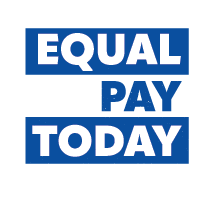CONTACT
Nazirah Ahmad
nazirah@emccommunications.com
(704) 290-6869
New Census Bureau Numbers Shed Light on Continuing Pay Gaps for Women
The new income data shows most pay disparities have widened based on race and gender
Sept. 10, 2024—Today, the U.S Census Bureau released new wage data from 2023, which shows most of the wage gaps for women have grown wider since 2022, with women continuing to occupy some of the lowest-paying jobs overall. According to the new data, for every dollar a man is paid, a woman working full-time, year-round typically is paid just 83 cents. When looking at all earners, including part-time/seasonal, part-year, and full-time, women, on average, only make 75 cents compared to men. The pay disparities are even more severe for most women of color.
Here is the new breakdown on the pay gaps by race and gender:
All women compared to all men:
Full time: 83 cents
All earners: 75 cents
Black women compared to white, non-Hispanic men
Full time: 66 cents
All earners: 64 cents
Latinas compared to white, non-Hispanic men
Full time: 58 cents
All earners: 51 cents
Asian American women compared to white, non-Hispanic men
Full time: 94 cents
All earners: 83 cents
Note: Data used to calculate the pay gaps experienced by Native American Women, Native Hawaiian Pacific Islander (NHPI) Women, Moms, and Women with Disabilities are expected to be released in subsequent data sets this week and some later this year.
Founded in 2013, the Equal Pay Today campaign, is a national coalition of over 40 nonprofit and advocacy organizations that advocate for pay equity for women and LGBTQIA+ people, especially women of color. Equal Pay Today is a project led by Equal Rights Advocates.
“Each year, these numbers show us the persistence of the devastating gender and racial wage gaps that women continue to face,” said Deborah J. Vagins, director of Equal Pay Today campaign, a project at Equal Rights Advocates. “Wage justice means that families must be able to bring home everything they have rightfully earned and they need new policy tools at the federal and state level to do so. Our policymakers have the power to ensure equity for all workers, to combat pay discrimination, and to lift countless families out of poverty by adopting policy solutions that address the key drivers of the wage gaps and ensure that all women are paid fairly. We demand no less.”
The current Equal Pay Today policy agenda offers solutions to address these egregious pay gaps and promote wage justice. Some recommendations include: implementing transparent pay practices and accountability mechanisms; strengthening current equal pay laws, passing new legislation to increase equity, ban workplace harassment, eliminate the subminimum and tipped wages for vulnerable workers; and support paid family leave, paid sick and safe leave, and other workplace protections.
To speak with equal pay experts from Equal Rights Advocates, contact Nazirah Ahmad at (704) 290-6869 or nazirah@emccommunications.com.
###
About Equal Rights Advocates
Equal Rights Advocates fights for gender justice in workplaces and schools across the country. Since 1974, they have been fighting on the front lines of social justice to protect and advance rights and opportunities for women, girls, and people of all gender identities through groundbreaking legal cases and bold legislation that sets the stage for the rest of the nation.
